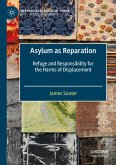This book argues that states have a special obligation to offer asylum as a form of reparation to refugees for whose flight they are responsible. It shows the great relevance of reparative justice, and the importance of the causes of contemporary forced migration, for our understanding of states' responsibilities to refugees. Part I explains how this view presents an alternative to the dominant humanitarian approach to asylum in political theory and some practice. Part II outlines the conditions under which asylum should act as a form of reparation, arguing that a state owes this form of asylum to refugees where it bears responsibility for the unjustified harms that they experience, and where asylum is the most fitting form of reparation available. Part III explores some of the ethical implications of this reparative approach to asylum for the workings of states' asylum systems and the international politics of refugee protection.
"The author takes complex political theories and makes them accessible to technical and non-technical audiences-a substantial strength of the book. ... Souter's clear and concise language makes the book ideal for scholars, practitioners and students who are interested in the topics presented. ... As the world looks forward to a potential future ... addressing the responsibility for displacement and reparations as a form of asylum will become more imperative, as will the ideas discussed in this book." (Serena Clark, International Affairs, Vol. 99 (1), 2023)








